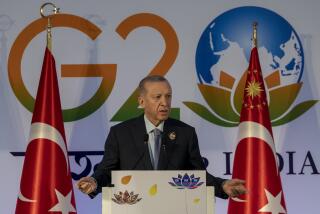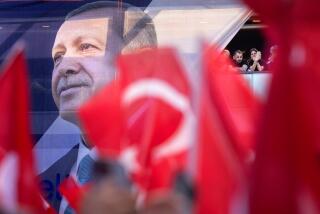U.S. ALLY IN A KEY REGION : Ozal Seeks to Translate Role as Gulf War Ally Into Power for Turkey : Diplomacy: Talks with Baker, who arrives today, may show Ankara the limits of its postwar goals.
ANKARA, Turkey â The breakfast rooms and bars of Ankara hotels, so lately vacant in grim winter uncertainty, now buzz with the polyglot crackle of deals-in-the-making. Waiters back from compulsory vacations skitter busily among buyers and sellers rebuilding bridges severed by months of crisis that climaxed in war.
Everybody acknowledges that Muslim, secular and democratic Turkey, a four-square U.S. ally, stands proudly among the winners in the Persian Gulf War. What is less clear as Secretary of State James A. Baker III joins the deal makers here today is exactly what Turkey has won--and which of its ambitious postwar goals will prove stillborn.
If Bakerâs talks with President Turgut Ozal showcase the fruits of victory for Turkey, they may also highlight shortfalls.
Ozal dreams big. In the aftermath of war, the pugnacious and dynamic Turkish leader may have to settle for half a loaf in pressing for recognition of Turkey as a major power with a key role in forging regional stability.
âAs the new order is made in the Middle East, Turkey may not be able to attain its wished-for input. President Ozal is right to be worried,â Uluc Gurkan, editor of the liberal newspaper Gunes, observed.
Instability and Kurdish unrest in neighboring Iraq pose grave problems for Turkey, which asserts the inviolability of Iraqi frontiers but is locked in a circle of suspicion with Syria, ruled by the secular Baath Arab Socialist Party, and Islamic fundamentalist Iran about the shape of Iraqâs future.
For the autocratic Ozal, Gulf policy was a one-man show. From the outset, he has been far out in front of Turkeyâs political, economic and military leadership, as well as public opinion in a country weaned on nonintervention as the foundation of its foreign policy. Now, Ozalâs ruling Motherland Party is in trouble, split internally by the political ambitions of his wife, Semra, and assailed by opponents on the left and right.
Ozal insists that Turkey is a Western nation. But Europe remains lukewarm about Turkey in general--and frigid in particular to Ozalâs request for Turkish membership in the European Community. Unalloyed Greek hostility over the Mediterranean island of Cyprus has blocked an $800-million EC development package to Turkey for the past decade.
âTurkey is a loyal ally for Europe, but theyâre just giving us lip service. Weâre being treated like a second-class state and not shown any respect,â complained Oktay Eksi, a senior columnist for the nationalist newspaper Hurriyet.
Said one senior West European ambassador here: âThe feeling is widespread that Turkey has earned credit which should be cashable, but I fear Ozal is raising expectations about Europe that will be disappointed.â
Since World War II, Turkey has been a pillar of the North Atlantic Treaty Organization, but in the new Europe, NATOâs future commitment remains uncertain for Turkey. Powerful friends are as vital as ever, though, in Turkeyâs tough neighborhood: ports on four sometimes contentious seas and land borders with Iraq, Iran, Syria, Greece, Bulgaria and the restive Soviet republics of Azerbaijan, Armenia and Georgia.
âTurkey will be closely involved in every event of our region,â Ozal promised Turks in a recent address. âWe showed perhaps for the first time that Turkey could take on a dynamic and determined policy appropriate to that of a great country.â
Perhaps. But Arab states, many of them with bitter recollections of their days as outposts of Turkeyâs Ottoman Empire, have rebuffed Ozalâs advances to carve out a greater regional role.
In the postwar haze, the golden arrow in Ozalâs quiver is that Turkeyâs relations with the United States have never been better.
When the Gulf crisis flared last summer, Ozal promptly closed pipelines through Turkey that carried Iraqi oil to market. He massed the Turkish army on the frontier, partly at U.S. behest, siphoning off eight Iraqi divisions that might have gone to Kuwait. When war began, the big Incirlik air base in southern Turkey became a springboard for strikes against Iraq by American warplanes.
Todayâs talks with Baker, a prelude to a meeting between Ozal and President Bush at Camp David next weekend, will turn on the question of future security agreements between the two countries, diplomatic sources say, and will also have an economic component in Turkeyâs quest for greater access to the U.S. market.
As a thank-you from Bush before the fighting began, Turkeyâs textile quota increased 50%, and in advance of Bakerâs arrival, the United States made a $50-million payment on promised assistance.
Turkey wants desperately to modernize and streamline its conscript armed forces. It seeks the sort of sustained American military aid that will require scrapping a congressionally imposed formula that gives Greece $7 for every $10 that goes to Turkey.
To Greek disquiet, the Bush Administration has already at least temporarily suspended the formula, pledging more than $600 million in mostly military assistance to Turkey--with the prospect of several billion dollars worth of arms still to come. Germany is also contributing more than $1 billion in cash, arms and ammunition to upgrade Turkish military equipment.
âTurkey will have a definite role in any security system for the Middle East, but the U.S. should also be present, or else this force will not be able to keep the peace,â Ozal told reporters traveling with him in the Soviet Union.
As a guarantor of future regional peace, the United States may want new bases in Turkey, or at least depots at which to position military equipment against a new flare-up. Ozal should be receptive. His unabashed pro-allied stand has done more than pay great dividends for Turkeyâs international prestige: war has also removed Iraqâs Saddam Hussein as a military threat.
On a state visit to the Soviet Union this week, Ozal won praise from both Mikhail S. Gorbachev and Boris N. Yeltsin. And with Hussein de-fanged, there is something to Ozalâs claim that Turkey may now be âthe strongest state in the Middle East.â
Cash aid is flowing to Turkey to offset an officially estimated $7 billion in Gulf War-related losses that ranged from a dearth of oil transit fees to the death of tourism. This week, Kuwait confirmed that it would add a $900-million contribution to what Turkish officials say may reach $4.2 billion in payments and pledges from Arab nations, the United States, Japan and Western industrialized countries.
Ozal predicts that the postwar era will reinvigorate an economic boom that has brought breathtaking modernization to his brawny nation of 57 million over the past decade.
Even, if as seems probable, complex postwar machinations prove Ozal overly optimistic, the backing of a grateful superpower, like the overnight reappearance of American and European business people, augurs a higher international profile for Turkey.
âThe international environment has changed,â said State Minister Kamran Innan in an interview here. âThe bloc system is ended. Turkey has to accept, against her will, that she is a regional power.â
More to Read
Sign up for Essential California
The most important California stories and recommendations in your inbox every morning.
You may occasionally receive promotional content from the Los Angeles Times.










